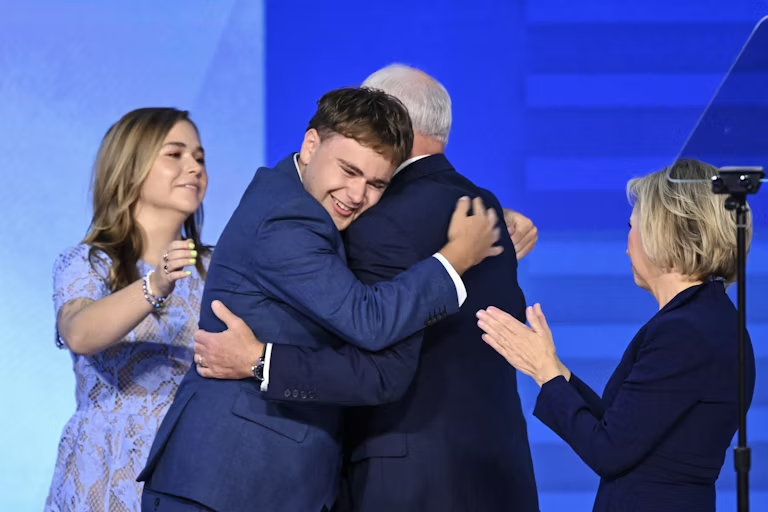Introduction: The Viral Moment and Its Aftermath
The Democratic National Convention recently witnessed a powerful and emotional moment that quickly became one of the most talked-about events of the night. Tim Walz, the Governor of Minnesota, accepted the vice-presidential nomination with his family by his side.
However, it was his 17-year-old son, Gus Walz, who stole the spotlight. The sight of Gus, overwhelmed with pride and emotion, crying during his father’s speech, became an iconic image that resonated across the nation.
Yet, this feel-good moment was soon tainted by a controversial social media post from conservative commentator Ann Coulter, sparking a fierce backlash and highlighting the challenges faced by individuals with learning disabilities.
The Controversial Post: Ann Coulter’s Attack on Gus Walz
Ann Coulter, known for her provocative statements, took to X (formerly Twitter) to comment on Gus Walz’s emotional reaction. Posting a photo of the teenager in tears, Coulter captioned it with a dismissive remark: “Talk about weird…”. The backlash to her post was immediate and intense. The online community quickly rallied in defense of Gus, with many pointing out the insensitivity of Coulter’s comment, especially considering Gus’s struggles with a non-verbal learning disorder, ADHD, and anxiety.
Former Obama staffer and liberal podcaster, Tommy Vietor, was among the first to respond, tweeting, “I can see why a child loving their parents would feel foreign to you.” The sentiment was echoed by many others, including Shannon Watts, the founder of Moms Demand Action and Everytown, who shared her own experiences with neurodivergence, stating, “We’re not weird, we’re wonderful. And we’re your family, friends, and fellow Americans.”

The Impact of the Viral Moment: Raising Awareness for Learning Disabilities
The viral nature of the moment has unexpectedly brought significant attention to the challenges faced by individuals with learning disabilities. Gus Walz, who is neurodivergent, became a trending topic on X, and the search terms “non-verbal learning disorder” and “ADHD” spiked on Google in the aftermath. This sudden focus on Gus’s condition has opened up a broader conversation about the realities of living with learning disabilities and the need for increased awareness and support.
According to the NVLD Project at Columbia University, non-verbal learning disorder (NVLD) is characterized by difficulties with social and spatial abilities, which can lead to marginalization and isolation. People with NVLD often face significant social barriers throughout their lives. This condition, although not as well-known as other learning disabilities, is now in the spotlight, thanks to the viral moment involving Gus Walz.
The Role of Special Education: The Federal Funding Gap
Gus Walz’s story has also reignited discussions about the challenges in funding special education across the United States. The Individuals with Disabilities Education Act (IDEA), passed in 1975, mandates that schools provide special education services to students with disabilities. However, the federal government has consistently fallen short of its commitment to cover 40% of the average per-pupil expenditure for special education, providing only about 13% instead.
This funding shortfall places a significant burden on local school districts, which are left to cover the remaining costs. John Eisenberg, Executive Director of the National Association of State Directors of Special Education, emphasized that this unfulfilled federal commitment is a nationwide issue. “The federal act is first and foremost a civil rights law, meant to protect the right of students with disabilities to be educated in the nation’s public schools,” Eisenberg stated. However, without adequate funding, many students do not receive the services and support they need.
Tim Walz’s Commitment to Education: A Glimpse of Hope
As governor, Tim Walz has made significant strides in increasing education funding in Minnesota, including substantial investments in special education. In 2024, Walz signed a two-year budget that included a 6% increase in per-pupil funding for local schools, with future funding indexed to inflation. This budget also provided a large boost in state support for special education, helping to fill the gap left by insufficient federal funding.
The Democratic Party’s platform, adopted at the recent convention, underscores the importance of fully funding IDEA to prioritize students with disabilities and support the special educator workforce. However, the actual prospects for more federal funding remain uncertain, largely dependent on future budget negotiations and the composition of the next Congress. Nevertheless, the Harris-Walz ticket’s focus on education offers hope for increased attention to the needs of students with disabilities on a national scale.
The Backlash Against Ann Coulter: A Lesson in Empathy
Ann Coulter’s post may have been intended to provoke, but the response it generated highlights a growing societal shift towards greater empathy and understanding of neurodivergence and learning disabilities. The swift backlash against Coulter’s insensitive remark is a testament to the increasing awareness and acceptance of individuals with these challenges. In a world where social media often amplifies negative voices, the overwhelming support for Gus Walz serves as a reminder that kindness and understanding can prevail.
The Importance of Representation: Gus Walz as a Symbol of Resilience
Gus Walz’s emotional display at the Democratic National Convention and the subsequent media attention have turned him into a symbol of resilience for many. His tears were not just a reaction to his father’s achievements but a reflection of his own journey and struggles. For individuals with learning disabilities, seeing someone like Gus in the spotlight offers representation and validation of their experiences.
As society continues to evolve in its understanding of neurodivergence, stories like Gus’s play a crucial role in breaking down stigma and fostering a more inclusive environment. The fact that Gus’s moment of vulnerability resonated with so many people is a powerful indicator of the progress being made in recognizing and celebrating the diversity of human experiences.
Conclusion: Moving Forward with Compassion and Understanding
The story of Gus Walz, his moment of pride, and the subsequent controversy sparked by Ann Coulter’s post is a reminder of the power of empathy in shaping public discourse. As the conversation around learning disabilities continues to grow, it is crucial that we approach these discussions with compassion and a commitment to understanding. Gus’s story has not only highlighted the challenges faced by individuals with learning disabilities but has also demonstrated the importance of representation and the need for continued advocacy for special education funding.
In the end, the viral moment at the Democratic National Convention was more than just a fleeting social media sensation. It was a catalyst for a broader conversation about the rights and dignity of individuals with learning disabilities, and a call to action for greater support and inclusion.
Discover more from
Subscribe to get the latest posts sent to your email.





